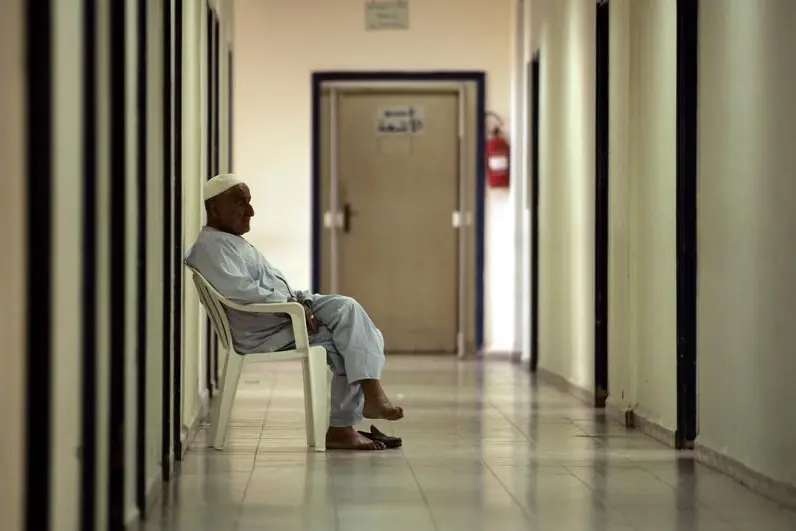PHOTO
BEIRUT - Outside one of Lebanon's leading hospitals, desperate parents arrive seeking help for their sick children, while inside its pediatric intensive care unit the beds lie empty and unattended.
There are simply not enough nurses to keep the unit open and staff are forced to turn away ill babies, said the hospital's pediatric critical care head Elie Choueiry, amid a nationwide exodus of medical workers that is straining health systems.
"Children are dying because they cannot be cared for," said Choueiry, of the Hotel-Dieu de France hospital in Beirut, whose empty children's unit still sports colourful walls and stories intended to soothe young patients.
"It's a dramatic and catastrophic situation."
Lebanon's economy has been in freefall since 2019 and its currency has lost more than 90% of its value, forcing nearly three-quarters of Lebanon's population into poverty, and leading many physicians and nurses to seek better opportunities abroad.
Once among the best in the Middle East, Lebanon's medical system is crumbling as hospitals and surgeries struggle to cope with departing staff on top of financial troubles and shortages.
The World Health Organization (WHO) estimated in September 2021 that nearly 40% of Lebanon's doctors and almost 30% of nurses had departed since October 2019.
Still more are in the process of getting their papers ready to emigrate, according to Sharaf Abou Sharaf, head of the doctors' syndicate.
Many of those leaving are highly qualified specialists such as surgeons, emergency doctors and intensive care physicians, said Sharaf, forcing medical centres to close some departments as they no longer have the expertise to run them.
The Hotel-Dieu de France, one of the largest and most renowned hospitals in the country, has seen 133 out of 500 nurses leave since the beginning of the crisis.
"The worst part is that more families are trying hard to get their sick children into hospitals," said Choueiry.
Many hospitals have been unable to afford imported vaccines in recent years, he said, resulting in "a large group of children who aren't protected from disease and its effects".
POOR CONDITIONS
Healthcare workers say they are struggling to cope with a drop in their incomes as a result of the heavily devalued currency and growing workloads that leave them overstretched and patients at risk.
Nurses are now being asked by hospitals to care for up to 20 patients at a time, violating guidelines from the Order of Nurses which recommend a maximum of seven patients per nurse on duty, said the regulatory body's president Rima Sassine Kazan.
"The healthcare brain drain is jeopardizing the health of millions of people and the sector urgently needs CPR," said one medical professional who spoke on condition of anonymity.
Doctors and hospitals launched a two-day strike in May, announcing only emergency cases and dialysis patients would be admitted, in protest over central bank policies which they said were hobbling their ability to operate and pay staff.
The Lebanese pound is officially pegged at a rate of 1,500 to the dollar, but widely-used black market rates have seen it sink to 28,000 - a disparity which is dramatically impacting hospitals' expenses, revenues, and the value of pay packets.
Caretaker Lebanese Health Minister Firas Abiad said the ministry is working to stop the exodus of health workers.
"The plan includes increased investment in health infrastructure, fair pay for workers, and creating an overall environment that will benefit them and encourage them to stay in the country," he told the Thomson Reuters Foundation.
Meanwhile nurse Manal Zeiter, 32, said she never intended to leave Lebanon, but that the crisis had reshaped her life plans.
She left for Belgium last year because she wanted to live in a more stable environment "that doesn't need me to keep on panicking about the safety of my children, and helps me focus on my work and duties".
RISING COSTS
Lebanon's medical crisis is exacerbated by a shortage of drugs and other supplies. Blood and basic medicines including painkillers are frequently requested on social media.
The costs of medical appointments have also risen sharply, leaving the poorest struggling to get care.
Many Lebanese patients have to pay bills upfront, even if they are entitled to claim them back from the state. And as the value of the Lebanese pound has plummeted, some hospitals have started to charge in dollars, pushing up costs.
Some people have turned to alternative medicine as they cannot afford anything else.
Joumana Al Karim, a 40-year-old Beirut resident, was diagnosed with a slipped disk after suffering a bad fall and was initially scheduled to undergo surgery.
"I couldn't walk or sleep because of the excruciating pain in my leg," said Al Karim, a teacher at a private school.
"I was unable to get the operation because the hospital was without power for the entire day that it was scheduled - and luckily this made me escape the huge debt I was going to fall into to pay for my surgery."
She is now trying to make do with herbal medicines as she has run out of money for both painkillers and consultations.
"Herbal medicine isn't helping, but at least I'm trying to do something - something I can actually afford," she said.
(Reporting by Tala Ramadan @talaramadan; Editing by Sonia Elks. Thomson Reuters Foundation, the charitable arm of Thomson Reuters, that covers the lives of people around the world who struggle to live freely or fairly)





















